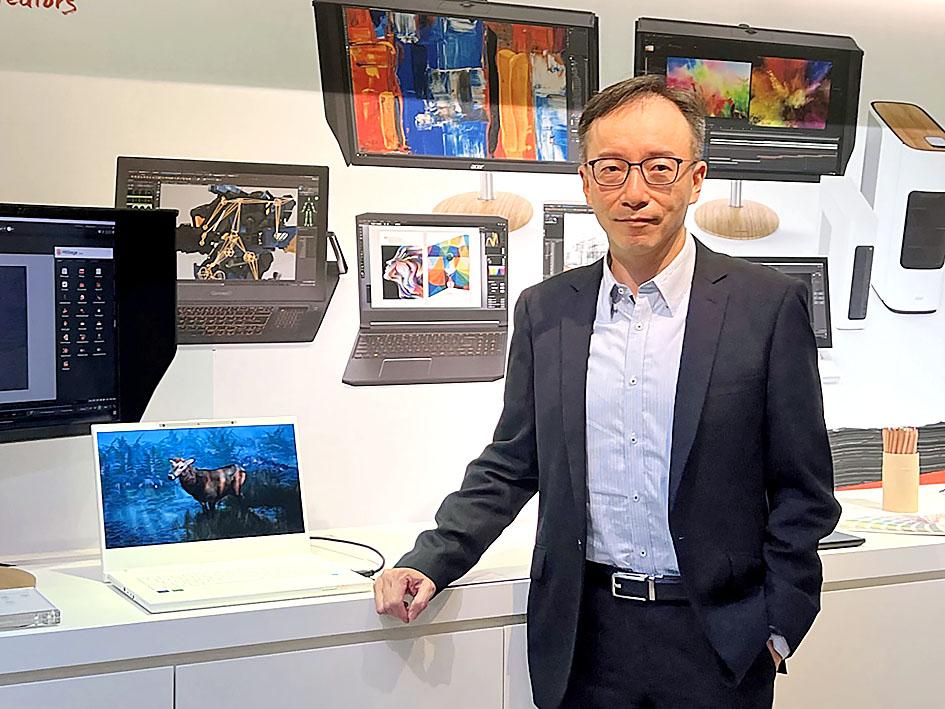PC vendor Acer Inc (宏碁) yesterday said that its “Made in India” strategy is starting to bear fruit, adding that 100,000 desktop computers are expected to be assembled in India next year, while laptop assembly capability would be “introduced as the need arises.”
The Indian government has demanded that at least half of computers purchased as a part of government projects need to be made in India.
By having its own local production capacity, Acer secured “an advantage over half the government tenders,” the company said.

Photo: CNA
“Acer went to India as early as 2000 and we have our own assembly plants there. We can customize according to the government tenders,” Acer Asia-Pacific regional president Andrew Hou (侯知遠) said. “Post [COVID-19] pandemic, the Indian government released a lot of demand for desktops and all-in-one machines, which we were able to capitalize on.”
For the third quarter, Acer’s revenue for all-in-one machines in India grew 369 percent year-on-year, while desktops grew 36 percent year-on-year.
Acer has a 3,252m2 production facility in India, the company said.
“Next year — as long as we have enough material and labor, and assistance from peripheral partners — we can even aim higher,” Hou said.
He predicted sales of at least 100,000 desktop computers in India next year.
The Indian market, from banks and governments to large enterprises, still uses mainly desktops.
However, Hou said that he has observed in increase in laptop demand, which began in the second half of last year.
“We will be experimenting with laptop assembly in India starting from November this year,” he said.
Hou said that he is bullish regarding overall demand for Acer products.
“Our Asia-Pacific region posted year-on-year revenue growth of 11.6 percent in the third quarter, a new single-season high since 2013,” Hou said. “We already have orders through the first quarter of 2022.”
Acer president of IT products business Jerry Kao (高樹國) said that Acer is looking to emerging markets for Chromebook demand, which he said has “yet to be satisfied.”
“I don’t think the American Chromebook market is saturated yet, while demand from Southeast Asia and Latin America is continuing to grow,” Kao said. “The remote work trend is not going away, and with it we will continue to see demand for Chromebooks.”
Another source of growth for Acer products is the commercial laptop market in the US, he said.
“COVID-19 caused a jump in commercial laptop demand, not from the enterprise side, but for work-from-home demand that requires commercial laptops,” Kao said. “This has been a big source of our commercial laptop demand.”

Sweeping policy changes under US Secretary of Health and Human Services Robert F. Kennedy Jr are having a chilling effect on vaccine makers as anti-vaccine rhetoric has turned into concrete changes in inoculation schedules and recommendations, investors and executives said. The administration of US President Donald Trump has in the past year upended vaccine recommendations, with the country last month ending its longstanding guidance that all children receive inoculations against flu, hepatitis A and other diseases. The unprecedented changes have led to diminished vaccine usage, hurt the investment case for some biotechs, and created a drag that would likely dent revenues and

Nvidia Corp’s GB300 platform is expected to account for 70 to 80 percent of global artificial intelligence (AI) server rack shipments this year, while adoption of its next-generation Vera Rubin 200 platform is to gradually gain momentum after the third quarter of the year, TrendForce Corp (集邦科技) said. Servers based on Nvidia’s GB300 chips entered mass production last quarter and they are expected to become the mainstay models for Taiwanese server manufacturers this year, Trendforce analyst Frank Kung (龔明德) said in an interview. This year is expected to be a breakout year for AI servers based on a variety of chips, as

Global semiconductor stocks advanced yesterday, as comments by Nvidia Corp chief executive officer Jensen Huang (黃仁勳) at Davos, Switzerland, helped reinforce investor enthusiasm for artificial intelligence (AI). Samsung Electronics Co gained as much as 5 percent to an all-time high, helping drive South Korea’s benchmark KOSPI above 5,000 for the first time. That came after the Philadelphia Semiconductor Index rose more than 3 percent to a fresh record on Wednesday, with a boost from Nvidia. The gains came amid broad risk-on trade after US President Donald Trump withdrew his threat of tariffs on some European nations over backing for Greenland. Huang further

HSBC Bank Taiwan Ltd (匯豐台灣商銀) and the Taiwan High Prosecutors Office recently signed a memorandum of understanding (MOU) to enhance cooperation on the suspicious transaction analysis mechanism. This landmark agreement makes HSBC the first foreign bank in Taiwan to establish such a partnership with the High Prosecutors Office, underscoring its commitment to active anti-fraud initiatives, financial inclusion, and the “Treating Customers Fairly” principle. Through this deep public-private collaboration, both parties aim to co-create a secure financial ecosystem via early warning detection and precise fraud prevention technologies. At the signing ceremony, HSBC Taiwan CEO and head of banking Adam Chen (陳志堅)